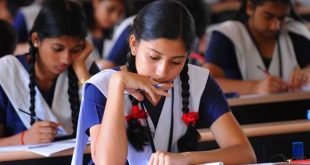Respiration in Organisms 7th Class NCERT CBSE Science Chapter 10 Question: What are the end products of aerobic respiration. Answer: During aerobic respiration, carbon dioxide and water are released along with a large amount of energy. Question: The cellular respiration process takes place in which cell organelle? Answer: Cellular respiration takes place …
Read More »Search Results for: CBSE
Soil: NCERT 7th Class (CBSE) Science Chapter 09
Soil 7th Class NCERT CBSE Science Chapter 09 Question: In how many groups the soil has been categorized? Name them. Answer: The soil has been categorized into four major groups, i.e. clay silt sand gravel Question: Which soil is considered to be the most fertile and used for growing crops? Answer: Loamy …
Read More »Physical and Chemical Changes: 7th CBSE Science Ch 06
Physical and Chemical Changes 7th Class NCERT CBSE Science Chapter 06 Question: What kind of change is shown by tearing of paper? Answer: Tearing of paper is a physical change although, it cannot be reversed. Question: Melting of wax is a change where a solid changes to liquid state. Give one more …
Read More »CBSE Board Exams to be held in schools, results in July
Results of the CBSE board classes will likely to be declared in July-end Pending 10th and 12th CBSE exams will be held at students’ schools and not at external centers Union Human Resource Development Minister Ramesh Pokhriyal on Thursday announced that remaining exams of 10th and 12th Central Board of …
Read More »Acids Bases and Salts: 7th NCERT CBSE Science Ch 05
Acids Bases and Salts 7th Class NCERT CBSE Science Chapter 05 Question: What is the test for acids and bases using litmus paper? Answer: Acids turn blue litmus paper red while bases turn red litmus paper blue. Question: What name is given to those substances which do not change the colour of …
Read More »Heat: 7th Class NCERT CBSE Science Chapter 04
Heat NCERT 7th Class CBSE Science Chapter 04 Question: In a mercury thermometer, the level of mercury rises when its bulb comes in contact with a hot object. What is the reason for this rise in the level of mercury? Answer: As the temperature increases, then expansion in mercury takes place which …
Read More »Fibre to Fabric: 7th Class NCERT CBSE Science Chapter 03
Fibre to Fabric NCERT 7th Class CBSE Science Chapter 03 Question: Name the sources of obtaining fibres. Answer: The sources of obtaining fibres are plants and animals. Question: Name some wool yielding animals. Answer: Wool yielding animals are sheep, yak, llama, alpaca, angora goat, angora rabbit and camel. Question: In which part …
Read More »Nutrition in Animals: 7th Class NCERT CBSE Science Ch 02
Nutrition in Animals NCERT 7th Class CBSE Science Chapter 02 Question: What is the total number of teeth in an adult human? Answer: In an adult human, there are total 32 teeth. Nutrition in Animals NCERT – Question: Name the parts of the alimentary canal where water gets absorbed from undigested …
Read More »Nutrition in Plants: 7th Class NCERT CBSE Science Ch 01
Nutrition in Plants 7th Class NCERT CBSE Science Chapter 01 Question: Why do organisms need to take food? Answer: All living organisms require food to survive. It gives them energy to perform various activities. All activities such as playing, running, walking, studying etc. require energy. The various components present in …
Read More »साँस-साँस में बाँस: 6th Class NCERT CBSE Hindi वसंत Ch 17
साँस-साँस में बाँस 6th Class NCERT CBSE Hindi वसंत भाग 1 Chapter 17 प्रश्न: बाँस भारत के किन-किन हिस्सों में बहुतायत होता है? उत्तर: अरुणांचल प्रदेश, असम, मेघालय, नागालैंड, मणिपुर, मिजोरम और त्रिपुरा इत्यादि भागों में बाँस बहुतायत होता है। प्रश्न: बॉस से कौन-कौन सी चीजें बनाई जाती हैं? उत्तर: बॉस से …
Read More » Class Notes NCERT Solutions for CBSE Students
Class Notes NCERT Solutions for CBSE Students


